Search
Did you mean: Tiglath Pileser I?
Summary 
Loading AI-generated summary based on World History Encyclopedia articles ...
Search Results
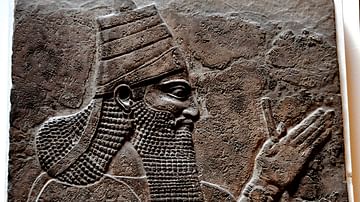
Definition
Tiglath Pileser III
Tiglath Pileser III (745-727 BCE) was among the most powerful kings of the Neo-Assyrian Empire and, according to many scholars, the founder of the empire (as opposed to the claims for Adad Nirari II (912-891 BCE) or Ashurnasirpal II (884-859...
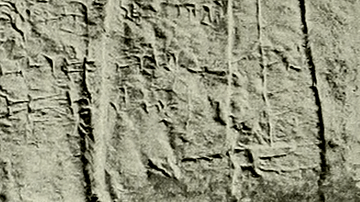
Definition
Tiglath Pileser I
Tiglath Pileser I (reigned 1115-1076 BCE), an Assyrian king of the period known as the Middle Empire, revitalized the economy and the military that had been suffering, more or less, since the death of the king Tukulti Ninurta I (1244-1208...
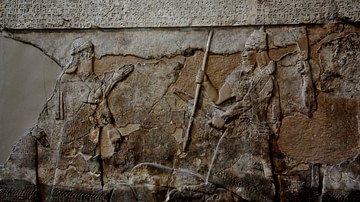
Image
Tiglath-pileser III, Submission of Enemy
An alabaster bas-relief depicting the Assyrian king Tiglath-pileser III stands over a captured enemy. The cuneiform inscription describes an Assyrian campaign in Iran 744 BCE. From the central palace at Nimrud (ancient Kalhu), reused and...
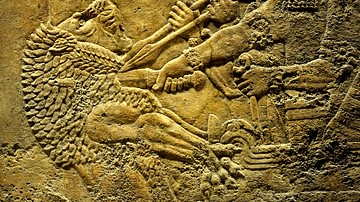
Definition
Assyria
Assyria was the region located in the ancient Near East which, under the Neo-Assyrian Empire, reached from Mesopotamia (modern-day Iraq) through Asia Minor (modern Turkey) and down through Egypt. The empire began modestly at the city of Ashur...

Image
King Tiglath-pileser III
An alabaster bas-relief depicting the Assyrian king Tiglath-pileser III. From the central palace, Nimrud (ancient Kalhu), Mesopotamia, northern Iraq. Neo-Assyrian era, circa 728 BCE. (The British Museum, London)
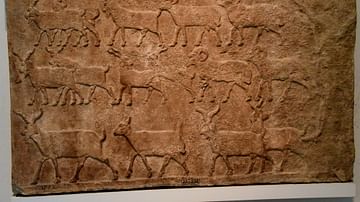
Image
Captured Flocks from Arab Enemies of Tiglath-pileser III
Sheep and goats, captured in a campaign against the Arabs are driven back to the Assyrian camp. This scene decorated the palace of King Tiglath-pileser III (reigned 744-727 BCE. Assyrian, about 728 BCE. From the Central Palace at Nimrud (ancient...
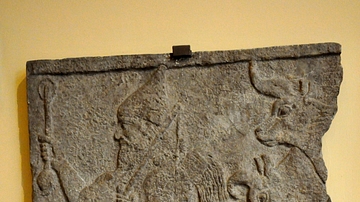
Image
A Wall Relief from Tiglath-Pileser III's Palace
A man holds a mace and a bow and a number of cows appear behind him. The name of the man is unknown. A fragment of a limestone wall relief from the palace of Tiglath-pileser III at Nimrud (ancient Kalhu; Biblical Calah). Neo-Assyrian era...
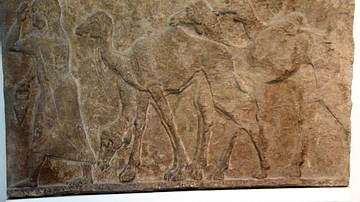
Image
Captured Camels from Arab Enemies of Tiglath-pileser III
The woman on the left and the herd of camels behind her are part of a procession of prisoners and booty captured during one of the military campaigns of Tiglath-pileser III (reigned 744-727 BCE) against Arab enemies. Assyrian, about 728 BCE...
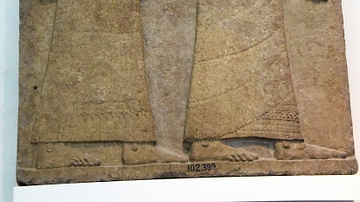
Image
King Tiglath-pileser III in a Ceremony
The Assyrian King Tiglath-pileser III (reigned 744-727 BCE) wears a ceremonial robe and holding a bow, once facing 2 high officials (no longer preserved but recorded in a drawing). Behind him, stands a beardless attendant holding a spear...
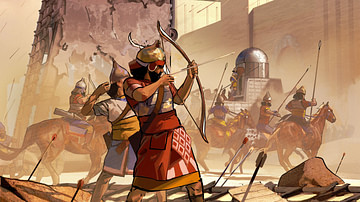
Definition
Assyrian Warfare
Assyria began as a small trading community centered at the ancient city of Ashur and grew to become the greatest empire in the ancient world prior to the conquests of Alexander the Great and, after him, the Roman Empire. While the Assyrians'...